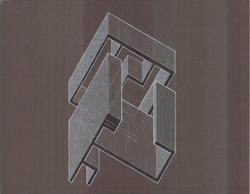Bachelor’s Program
As a major in our four-year Interior Studies: Adaptive Reuse BFA program, you receive an exceptional education in spatial design as it relates to the built environment. The program consists of 126 credit hours of coursework in Interior Architecture, studio electives and Liberal Arts classes across three departments: History, Philosophy and the Social Sciences, Literary Arts and Studies, and Theory and History of Art and Design.
In developing design strategies across a range of work, you learn how to investigate and make interior interventions in various forms, while recognizing the importance of social and environmental responsibility within the discipline. Graduates of the program earn a strong foundation that uniquely prepares you for graduate studies and professional design practice.
Curriculum
In the first year of the program, sophomores take introductory courses that cover the ideas and vocabulary of interior architecture and provide the basis for subsequent studios. Juniors further explore the field through advanced studios, supplemented by a broad range of technical, theoretical and historical courses.
Learning outcomes
Graduates are prepared to:
- evaluate their own individual talents, interests and aptitudes to determine a suitable career path.
- navigate a collaborative work environment in order to investigate aspects of interior interventions through conceptual thinking and critical making.
- develop design strategies that recognize the importance of social and environmental responsibility.
- understand design principles and the tools for implementing them to develop meaningful and coherent design propositions.
- recognize the importance of context in the transformation of space and acknowledge its implications in the formulation of design concepts.
- articulate design concepts and implement interventions based on the transformation of existing structures.
- communicate design ideas through drawings, projections and both physical and digital models.
- engage with interior interventions in the field and apply this knowledge in design projects of varying scales.
Undergraduate student work

Holden Rappuhn BFA 2025

Patharin (Minnie) Suponthana BFA 2024

Diana Lin BFA 2019

Danning Nui BFA 2019

Kelly He and Jenny Lu BFA 2019
Inspiring community
Approximately 100 combined undergraduate and graduate students work together in RISD's Center for Integrative Technologies. Students come from around the world and work with more than 25 full- and part-time faculty members who studied and practice in the US and abroad. This lends the department a very global, cosmopolitan feel and allows for especially fruitful collaborations and critical exchange.
Application requirements
Common Application
You’ll begin and manage your RISD application process by completing the Common Application. There is a nonrefundable application fee
Fee waiver
We want to make sure that application fees do not pose a barrier for any student. If you meet certain qualifications, you can request a Common Application fee waiver in one of the following two ways:
- Navigate to the "Fee Waiver" portion on the Common Application and select the option that most fits your family circumstances. This will allow you to submit your application without entering credit card information.
- If your situation does not match any of the Common Application’s waiver criteria, email admissions@risd.edu and we’ll process the waiver manually.
To receive a SlideRoom fee waiver, please email admissions@risd.edu.
Academic transcripts
Applicants must provide official transcripts of all secondary academic work through the most recent grading period. Your counselor may submit your transcript through the Common Application, Parchment, email or mail.
If your academic credentials are not written in English, they must be translated into English by an approved translator prior to submission.
Tests and test-optional
Test-Optional, SAT and ACT
We offer all applicants (domestic and international) the option to apply without submitting results from the SAT or ACT. You may opt into this process by selecting “test-optional” under the "Testing" portion of your RISD Common Application.
For students who choose to submit test scores, we will superscore your results, looking at your highest outcome across multiple test dates.
RISD’s institution code number for the SAT is 3726; for ACT the code number is 003812.
Transfer credits
You can use some Advanced Placement (AP), A-Level classes and International Baccalaureate (IB) credits toward RISD liberal arts requirements. First-year students can transfer a maximum of nine credits from AP courses with a score of 4 or 5, A-Level classes with an earned grade of C or higher or Higher Level IB scores of 5, 6 or 7. We will not accept AP or IB credit from art or studio classes.
VIEW OUR FULL TRANSFER CREDIT POLICY
English language proficiency tests
All applicants who speak English as a second language, including US citizens, must submit results from any one of these three options:
- TOEFL (Test of English as a Foreign Language)
- IELTS (International English Language Testing System)
- Duolingo (an online English test).
Since English proficiency is a prerequisite for acceptance, applicants are required to meet a minimum score of at least 93 on the TOEFL, a 6.5 on the IELTS or a 115 on Duolingo.
Plan to take the TOEFL or IELTS well in advance of the application deadline since it may take three weeks for your scores to be sent to RISD by the test agency. It may take up to four days for us to receive Duolingo test results.
The language test requirement may be waived for applicants who have completed their secondary education in an institution where English is the language of instruction. In addition, applicants must have three consecutive, full-time years of instruction without ESL, ELL or ENL courses. A waiver form can be found in the applicant portal and you can email the Admissions Office at admissions@risd.edu with any questions.
Portfolio
Portfolio submission
Your portfolio should present 12–20 examples of your most recent work showcasing your thinking and making. Once you've started your RISD application in the Common Application, you will be directed to the online platform SlideRoom to upload your portfolio.
What to include
The work you select should reflect a full range of your ideas, curiosity, experimentation and experience in creating and making. This can include work in any medium, in finished or sketch form, and can be the result of an assigned project or a self-directed exploration.
We strongly recommend that you include some examples that involve drawing and/or painting from direct observation (rather than from imagination, photograph or video). Since drawing and painting are fundamental tools for visual makers from initial concept to execution, it is valuable for reviewers to see examples of your experience with and approach to drawing.
While the majority of your portfolio should feature finished pieces, we suggest including some research or preparatory work in up to three—but no more than three—portfolio uploads/slides. This helps reviewers better understand how you develop your ideas.
Authenticity and documentation
The authenticity of the work in your portfolio is of great importance to the Admissions Committee. We will ask you to acknowledge that the work in your portfolio was conceptualized and created by you. In the case of collaborative work, we ask that you document your contributions and credit additional artists using the Additional Details field in SlideRoom.
We strongly discourage including excessive visual elements and text descriptions in a single slide submission. These are difficult to view and are likely to exceed the allowed submission limit.
You can submit additional angles or detail shots of some works across multiple slide submissions, combined into one composite including no more than three images, or in a single video upload. Editing is an important part of curating your portfolio. You may need to devise creative solutions to best show your work within the limits of submission guidelines.
We recommend the following file formats: jpeg, png, gif, mp4 and mov. These formats are most compatible with SlideRoom. We discourage Google Drive and zipped files.
You may be interested in attending or watching the recording of one of our portfolio tips webinars for more advice on how to approach your RISD application portfolio.
Artificial intelligence (AI)
RISD embraces the ethical use of artificial intelligence (AI) in the creative process. It is, however, important for the Admissions Committee to understand how and where AI was used. Any work supported or created by AI in your portfolio must include a description of your process and the tools you used in your making. We will ask you to acknowledge this within Slideroom.
College essay
RISD requires the Common Application personal essay (up to 650 words). You will find the writing prompts in the Writing section of the Common Application.
While we encourage you to adhere to the rules of good writing, we look for applicants who are not afraid to take risks in their expression. Please don't hesitate to use a writing style or method that may be outside the mainstream as you express a distinctive personal position in your essay.
Letter(s) of recommendation
Letters of recommendation can be very helpful to your application. One letter is required, although you may submit as many as three. Recommendation letters should be written by teachers or other professionals who have firsthand knowledge of your art or academic achievements and can comment on your potential as a student.
Please use the Common Application to invite your recommendation writers to submit letters through that service. Letters may also be emailed to admissions@risd.edu or sent directly to our mailing address (see “Submitting your materials” below).